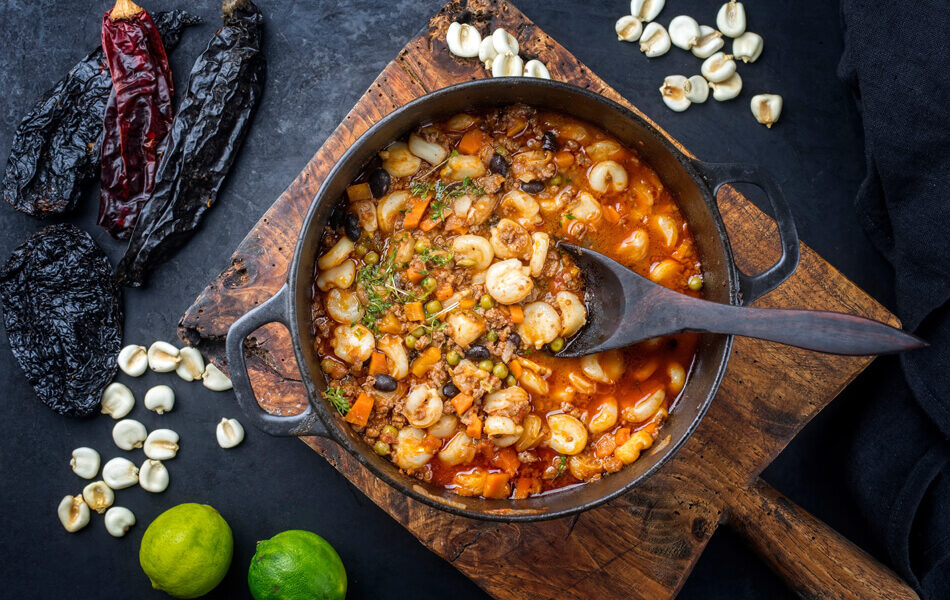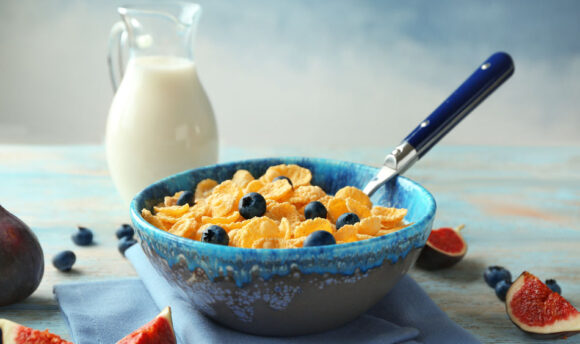Is Hominy Healthy? Nutrition, Benefits
Known for its subtle earthy and starchy taste, hominy is a popular ingredient in Mexican and Native American soups or stews. Let’s take a look at its nutritional content.

About three times larger than regular sweet corn, hominy is a unique addition to your soups, stews, or succotash. However, is hominy healthy to incorporate into your diet? Read on to learn more.
Is Hominy Healthy?
Hominy is healthy as it is low in calories, fat, and cholesterol. In addition, it is rich in vitamins and minerals. However, canned hominy is typically high in sodium and should be consumed in moderation.
What Is Hominy?
Hominy is a dried corn kernel with an earthy and nutty flavor. You can find white or yellow hominy corn kernels.
Imagine corn, but larger and fluffier – hominy is unique because it can be classified as a grain or a starchy vegetable, just like sweet corn.
Hominy is incredibly versatile and part of many different region’s cultures, including Southern cuisine.
In the United States, hominy is often ground up to make hominy grits but can also be used as whole kernels added into delicious dishes or simply eaten plain.
You can use finely ground hominy to make corn flour that can be used to create delicious corn tortillas or corn flakes.
Similar to dried beans, dried hominy must be rinsed and soaked in water. However, canned hominy is also an option.
Afterward, the hominy can be cooked in hot water or a stew, like pozole, until it is tender and chewy.
What Are the Health Benefits of Hominy?
Whether canned or dried, hominy has many nutritious benefits to your health. So, let’s dive into them.
#1 Great energy source
Hominy, while very low in calories, is rich in carbohydrates. It has 12 grams per 100-gram serving, according to the U.S. Department of Agriculture food database.
Carbohydrates are the body’s first energy source; therefore, hominy is an excellent energy source.
#2 Rich in omega-6 fatty acids
Both white and yellow hominy are rich in omega-6 fatty acids.
Omega-6 fatty acids are a type of unsaturated fat that plays a significant role in brain functioning, bone health, reproduction, and more.
#3 Naturally gluten-free
Unlike rice, white hominy and yellow hominy are naturally gluten-free corn kernels made from maize or field corn.
Therefore, it suits those with a gluten allergy, intolerance, or celiac disease.
What Are the Downsides of Hominy?
It is a popular ingredient in Mexican and Native American cuisine, and it is a source of essential vitamins and minerals. However, there are some downsides to consuming hominy.
#1 Low in fiber
Hominy is low in fiber, with 100 grams containing only 0.8 grams of fiber. Fiber is important for digestive health, and the general recommendation is to consume at least 25-38 grams of fiber per day. Therefore, it is important to include other high-fiber foods in the diet.
#2 High in sodium
Canned hominy is high in sodium, containing approximately 432 mg of sodium in 100 grams. This is nearly 30% of the recommended daily allowance for sodium.
High sodium intake is linked to an increased risk of some chronic diseases, including high blood pressure and heart disease, so it’s a good idea to use an app to keep track of the serving sizes if you suffer from any of these conditions.
Hominy Nutritional Value
Let’s dive into the nutritional content of hominy.
Nutritional table (per 100g)
| Calories/Nutrient | Amount |
| Calories (Kcal) | 56 kcal |
| Net Carbs (g) | 12 grams |
| Fats (Total) | 0 grams |
| Protein (g) | 0.8 grams |
| Sodium (mg) | 432 mg |
Source: https://fdc.nal.usda.gov/fdc-app.html#/food-details/1861411/nutrients
High in vitamins and minerals
Hominy is especially rich in B vitamins, including folate, niacin, and riboflavin.
Folate is a vitamin that helps form DNA and break down and metabolize proteins. Additionally, it is a crucial compound for red blood cell production and is greatly needed during pregnancy.
Niacin is a vitamin that also metabolizes energy and keeps your nervous system and digestion healthy. And finally, riboflavin is needed for the growth and development of cells in the body.
Low in protein
Unfortunately, hominy is relatively low in protein. For example, a 100-gram serving of hominy contains less than a gram of protein.
To bulk up the protein of your hominy dish, pair it with meat, fish, poultry, or eggs. You can even eat it with a plant-based protein source, such as tofu.
Low in fats and calories
A 100-gram serving of yellow or white hominy corn kernels only has 56 calories.
In addition, it has zero grams of fat, making hominy a great addition to any meal to get vitamins and minerals with minimal drawbacks.
You might see some hominy with a small amount of fat, such as 1.5 grams of fat, depending on the brand, canned versus dried, type of preparation, recipe, and much more.
High in sodium
However, hominy, especially the canned form, tends to have a high amount of sodium. For example, a serving of 100 grams of hominy contains 432 milligrams of sodium.
The American Heart Association recommends consuming no more than 2,300 grams of sodium daily.
A Word from a Dietitian
Hominy is an excellent energy source that provides a nutty and earthy flavor with a subtle grain taste. Rich in many different B vitamins, minerals, and more, hominy is an excellent addition to your meal. Add your cooked hominy to soups and stews, or eat it plain with a fresh garnish.
However, hominy only has a small amount of fiber, so to boost the dietary fiber intake, pair it with vegetables, whole grain rice, whole wheat tortillas or fiber supplements.
To reduce the overall sodium intake, rinse your canned hominy with water to remove some of the salt that is on the surface from processing.
Add your favorite herbs and spices to your hominy to add flavor, color, and many health benefits without many calories or salt.
FAQS
The main difference between corn and hominy is that hominy is made from dried corn kernels that have been soaked in an alkaline solution, while corn is a type of grain in its natural state. Hominy has a slightly different texture and flavor than corn, as the soaking process causes the corn kernels to swell and soften.
Hominy is good for you because it provides beneficial vitamins and minerals. However, it does contain high amounts of sodium.
Hominy is easier to digest since the corn kernel’s husk is removed.
Hominy is good for weight loss as it is low in calories and fat. However, it contains 12 grams of carbohydrates per serving of 100 grams.
Yes, hominy does contain protein. However, it is not a significant source of protein, with 100 grams of hominy containing approximately 0.8 grams of protein.
Conclusion
Hominy is a corn-based food product that is popular in Mexican and Native American cuisine. It is a source of essential vitamins and minerals, but it is also high in sodium and calories and low in fiber.
Therefore, it is important to be mindful of the amount of hominy consumed and to include other healthy foods in your diet.

















































 Select your language:
Select your language: 








